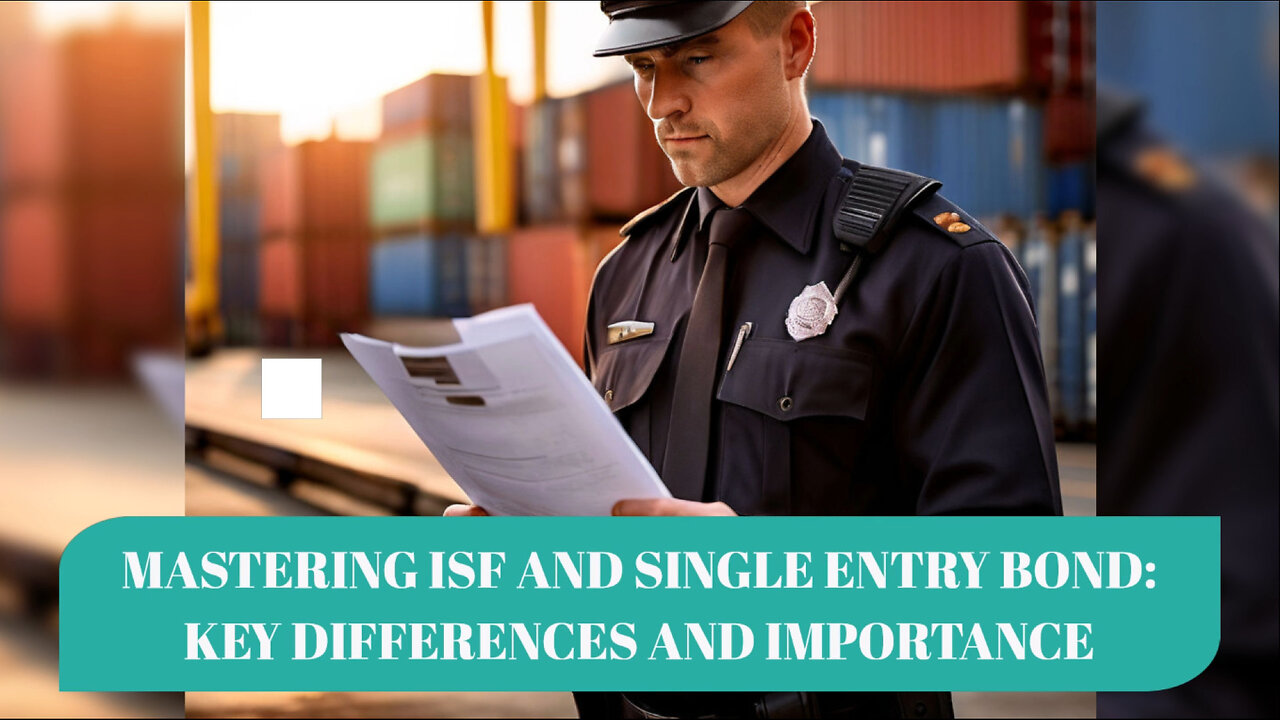Premium Only Content

ISF vs Single Entry Bond: Understanding the Key Differences in Import Process
License To Import // 323-578-6432 // file@licensetoimport.com // www.licensetoimport.com
In this video, we explore the concepts of Importer Security Filing (ISF) and Single Entry Bond requirements in the customs brokerage process. ISF is a mandatory filing requirement that enhances supply chain security by providing CBP with advance information about imports. It allows CBP to assess potential risks and make informed decisions regarding inspection and release. On the other hand, a Single Entry Bond is a financial guarantee that ensures payment of duties, taxes, and penalties, as well as compliance with customs regulations. ISF must be filed at least 24 hours before cargo is loaded, while a Single Entry Bond is typically obtained upon arrival at the port of entry. ISF is filed by the importer or their agent, while the bond is obtained and filed by the importer or their surety company. ISF focuses on security concerns, while the bond serves as a financial guarantee. Non-compliance with ISF can result in penalties and shipment delays, while non-compliance with the bond can lead to the suspension or revocation of the bond. Understanding these concepts is essential for smooth and compliant import operations.
#usimportbond #isfcustomsbroker #uscustomsclearing #isfentry
Video Disclaimer Here: This video is solely for education and is not endorsed by any US government agency.
00:29 - ISF (Importer Security Filing) is mandatory for most ocean shipments to the US, providing advance information to CBP for security reasons, while Single Entry Bond is a financial guarantee for importers to cover duties and taxes.
01:43 - ISF must be filed at least 24 hours before cargo is loaded, while Single Entry Bond is typically obtained upon goods' arrival at the port of entry.
02:08 - ISF is filed by the importer or their authorized agent, while the Single Entry Bond is obtained and filed by the importer or their surety company.
02:56 - Non-compliance with ISF can lead to penalties and shipment delays, while failure to comply with the Single Entry Bond can result in bond suspension or revocation, affecting import activities.
-
 LIVE
LIVE
Bannons War Room
3 days agoWarRoom Live
16,117 watching -
 2:03:31
2:03:31
Matt Kohrs
10 hours agoPAYDAY FRIDAY!!! || The MK Show
29K2 -
 6:46
6:46
Tactical Advisor
5 hours agoHow To Make Your Dream Gun Room/Mancave
20.5K5 -
 42:30
42:30
BonginoReport
5 hours agoThe FBI's Worst Nightmare CONFIRMED (Ep.145) - 02/21/2025
71.8K145 -
 LIVE
LIVE
Wendy Bell Radio
6 hours agoBatting 1000
10,609 watching -
![CIA EXECUTES LARGEST MASS FIRING IN 50 YEARS - HEGSETH FIRES WOKE GENERAL [EP 4448-8AM]](https://1a-1791.com/video/fwe2/78/s8/1/e/3/n/9/e3n9x.0kob-small-CIA-EXECUTES-LARGEST-MASS-F.jpg) 3:58:34
3:58:34
The Pete Santilli Show
18 hours agoCIA EXECUTES LARGEST MASS FIRING IN 50 YEARS - HEGSETH FIRES WOKE GENERAL [EP 4448-8AM]
30.3K3 -
 1:22:46
1:22:46
Jeff Ahern
3 hours ago $1.74 earnedFriday Freak out with Jeff Ahern (Chainsawing DEI)
26.8K2 -
 46:31
46:31
PMG
14 hours ago $0.46 earnedHannah Faulkner and Mary Flynn | REVIVING THE AMERICAN DREAM - GROWING UP A FLYNN
25.8K1 -
 3:01
3:01
Kirill MultitoolOfficial
1 day ago $6.01 earnedSurvival skills and Bushcraft HACKS in the forest!
42.4K5 -
 11:52
11:52
Dr. Nick Zyrowski
14 hours agoWhat Can I Eat On The Carnivore Diet? | Detailed Guide
46.6K8